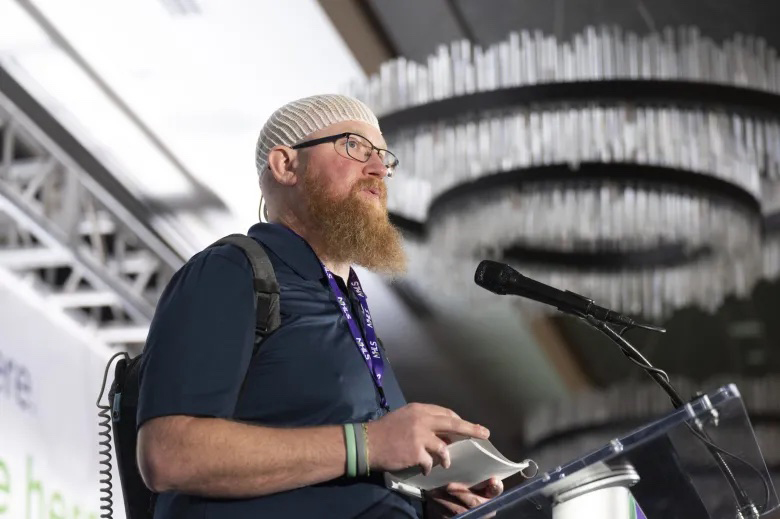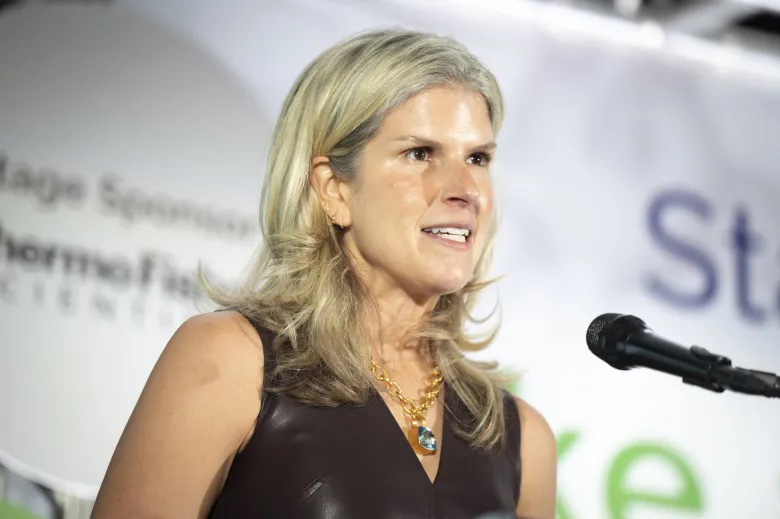(Opinion) PBM reform is the bipartisan solution patients need
Reform bill cosponsored by U.S. Sen. Maggie Hassan would break the link between PBM compensation and drug prices

Taylor Gray wears Novocure’s Optune Gio while recounting his experience during the treatment of his glioblastoma during the NHLS Live Free Life Science 2025 event at The Artisan at Tuscan Village, in Salem, NH, on Nov. 12. (Photo by Daniel Sarch, Granite State News Collaborative)
The most compelling takeaway from New Hampshire Life Sciences’ second annual gathering this month was delivered by a young father whose life has been extended thanks to medical technology developed by one of the state’s biggest players.
Taylor Gray, who lives with his family in Colorado, shared his experience with Optune Gio, a wearable medical device that uses electrical fields to disrupt the division of cancer cells that cause glioblastoma, an aggressive form of brain cancer.
The device was developed by Novocure, a Swiss company whose U.S. headquarters is based in Portsmouth. The founding partner of New Hampshire Life Sciences is one of more than 50 companies that have joined the nonprofit trade group since it was founded two years ago.
Gray was 31 when he was diagnosed with grade four glioblastoma. The small business owner and father of two daughters underwent surgery, radiation and chemotherapy. Gray’s oncologist recommended Optune Gio as part of his treatment plan.
Gray tempered his endorsement of Optune Gio — it has helped keep him alive — with details about his difficulties, including the skin irritation that comes from wearing it on his shaved head. Since starting to use the device, he suffered a seizure that left him unable to drive for six months.
“I was able to get through it though, thanks to my family,” Gray told a conference room full of industry representatives at the Artisan Hotel in Salem’s Tuscan Village on Nov. 12. “I get an MRI every six months now, and so far the results have been great. I’m currently tumor free.”
Novocure, which has operated a field office in New Hampshire since 2006, renewed its commitment to the region in September with the opening of a new headquarters building in downtown Portsmouth, where it employs more than 200 people and can accommodate more than 300 there.
New Hampshire is home to more than 600 life science businesses that manufacture pharmaceuticals, create medical devices and equipment, and biotech research and development.
“We have an extraordinary opportunity to support our companies today, and also to work toward making New Hampshire a globally known hub for life sciences development and manufacturing,” said Andrea Hechavarria, president and CEO of New Hampshire Life Sciences, during her opening remarks.
“We have companies here in New Hampshire that are touching the lives of patients across the globe, and likely even in your own home,” she said.
Gov. Kelly Ayotte pledged to help companies in the life sciences industry navigate permitting processes and recruit the workforce they need through partnerships with the state’s universities and community colleges.
“This is the sector where things are happening in New Hampshire, and we are punching way above our weight,” Ayotte said. “And that is thanks not only to this organization, but to all the companies that make up this organization, from the small startups to the well-established players.”

NHLS President and CEO Andrea Hechavarria speaks during the NHLS Live Free Life Science 2025 event, at The Artisan at Tuscan Village, in Salem, NH, on Nov. 12. (Photo by Daniel Sarch, Granite State News Collaborative)
Building a life sciences workforce
During a panel talk moderated by New Hampshire Life Sciences co-founder Cindy Conde, representatives from business and education talked about strategies, such as apprenticeships and internships.
Mostly, they talked about how the need to generate more attention about the industry’s growth and workforce needs.
Matt Simon is executive director of the UNH Biotechnology Innovation Center, which is housed at the university’s Manchester campus. It’s down the road from the Advanced Regenerative Manufacturing Institute, which recently hosted a groundbreaking to outfit space in a Millyard building for a manufacturing center to make cell-based body repair products.
“I’m not in the business of trying to make New Hampshire look like another place,” Simon said. “I’m in the business of shouting from the mountaintops that New Hampshire is awesome, and we are doing amazing things here right now, and that you need to be a part of it and instill a huge sense of FOMO (fear of missing out) to get companies and people here.”
Safi Biotherapeutics is already manufacturing red blood cells at an ARMI lab to produce an alternative to donor blood transfusions for commercial and military use. Doug McConnell, co-founder and CEO, noted the diverse workforce needed to develop and commercialize the technologies companies like his will produce. It extends far beyond Ph.D. scientists.
“You need people to do all the documentation, who understand the policies and the regulations,” he said. “You need lawyers. You have patent lawyers to protect these inventions that are being discovered. You need business people. You need people who are keeping the lights on and keeping the place not just clean, but in our case, purely clean.”
Jean-Paul Oulette, chief of staff at Lonza, is a good example of the wide reach of disciplines companies are seeking.
Prior to joining the Portsmouth biotech and pharmaceutical company three years ago, he had a 20-year career as a high school teacher and prep school administrator.
“What is often needed are soft skills that aren’t quite as technical,” Oulette said. “Does somebody have a lot of creative energy? Are they good collaborators? Do they have a good team work ethic? Sometimes you can find people that may not have a science background, but you can train them.”
Anne Banks, apprenticeship programs manager for the Community College System of New Hampshire, said the programs she oversees represent “the long game.”
“What we do is work with the organizations to map out career paths within your organization, and really start to build stackable credentials through apprenticeship programs,” Banks said. “It’s not going to meet that immediate need, but what you’ll end up doing is continually having a pipeline of individuals that can move throughout your company and really help you to train and grow your own workforce.”
Jennifer MacDonald, whose talk followed the workforce discussion, reminded the group of why their mission matters.
“We’re in a state in this nation where 6 in 10 Americans live with at least one chronic illness. Four in 10 live with at least two,” said MacDonald, chief operating officer for ARMI and a former family physician. “That affects our economy to the tune of nearly 20% of our GDP. That affects our military readiness. That affects our communities, our very own families.”
Statistically, nearly everyone knows or loves someone with chronic illness or lives with it themselves, MacDonald said: “And now we have the ability to change it.”